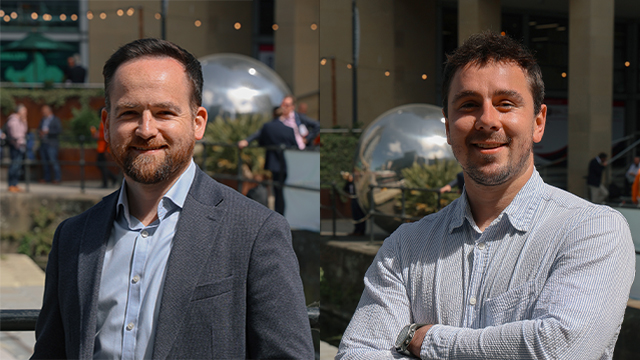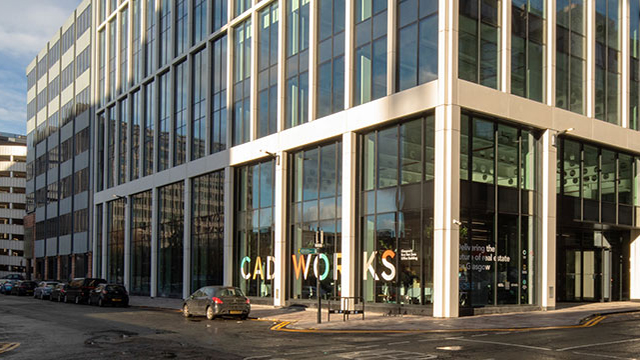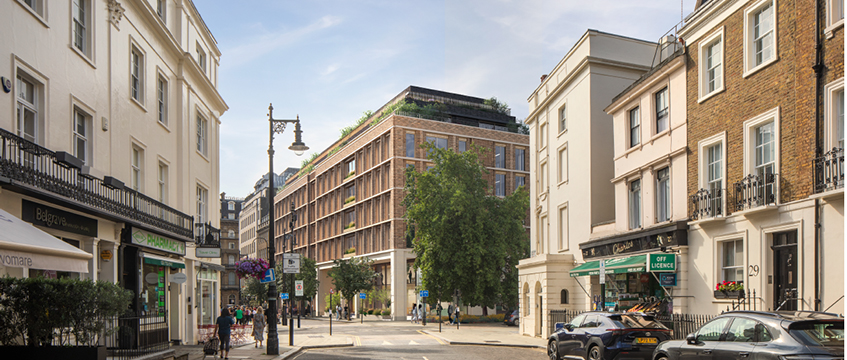Entrepreneurial investor Pelham Partners is putting US money into European property. By Alex Catalano.
Pelham Partners is one of the fashionable American-run funds currently investing in Europe. But Roger Orf and Don Blenko have their own twist on business, one they think differentiates them from the Goldman Sachs, Morgan Stanleys, Lehman Brothers and Bankers Trusts.
“We’re more interested in trying to get things off-market, trying to do it with people we know and appreciate, actually looking at the nuts and the bolts of the property and where the value is,” says Orf.
Says Blenko “I think we are more property driven. A place like Goldman Sachs, because they have to do large deals, is more like statistical underwriting. They take a view on a market – more recently France – and they say, it’s undervalued, and we want to buy as much as we can at whatever the clearing price is because with think cyclically it’s depressed, and now’s a good time to buy.”
The reference to Goldman Sachs is relevant, as Orf and Blenko both worked there previously: first in the US and later running Goldman’s Whitehall Street real estate fund in the UK. They left in 1994 and set up Pelham.
Says Orf: “We felt that the business we wanted to have was going to be relationship-driven, guided in large measure by our local operating partners.
The duo’s thinking was that there was a significant amount of American capital that was focused on entrepeneurial ventures in the US. “We reckoned that if we could take 5% of that and convince it to come over here, we’d have a business. It’s the diversity arguement.”
Based in London, with a small team of five, Pelham has participated in some $1.2bn worth of deals in Europe in the last three and a half years. The initial break came when Cyril Dennis, the former head of Berisford Properties, wanted to bid on $61.8m portfolio that UK insurer Norwich Union was selling, and asked Pelham if it was interested in the deal. “We thought it was a very sensible transaction,” says Orf. He approached Bill Mack and Lee Niebart, at the Apollo real estate fund in the United States, to see if they were interested in co-investing. “Because I’d been in America a long time involved with real estate, I knew many of the players who were running these funds,” says Orf.
Apollo was set up by Leon Black, a former Drexel Burnham Lambert banker. Starting with corporate investments, it branched out into real estate in the US. Pelham is now Apollo’s European conduit, putting the US capital in alongside its own. The equity is then leveraged up with borrowings.
The NU transaction had all the hallmarks Pelham was looking for. It was a large mixed portfolio of secondary property. It had a substantial amount of retail, which in 1995 was still arguably a bombed-out sector. “It was the partner, it was the amount of leverage we could get on the property. It was the opportunity to manage it actively, to take it up to a higher occupancy level,” says Orf.
With a net initial yield in the low teens, rising to 17% or 18% after funding, and 20% to 25% after re-leasing, this sort of deal provided a healthy income play. And the plan is that the re-worked assets will eventually be sold off.
The UK has provided good pickings for Pelham. Institutional investors are turfing out so-called secondary properties: those which are too small or too time-consuming to keep in their portfolios. Others are getting out of the sector altogether. Among Pelham’s other UK deals are the $210.6m purchase, with John Beckwith’s vehicle, Portfolio Holdings, of Colonial Mutual’s entire portfolio and another $41m collection from Norwich Union, in partnership with Leo Noe’s REIT Asset Management.
In 1996 Pelham moved onto the continent: first Spain, then Belgium and Holland. France and Eastern Europe are next. Currently the split of assets is about 80% in the UK and 20% in continental Europe. “Our ambition is by the end of this year to be 50-50. It’s not that we don’t like the UK, it’s just that we see continental Europe as deeper in the cycle. On a risk-adjusted basis, some of the opportunities we are seeing there are opportunities we can’t find here any more,” explains Orf.
In Spain, Pelham teamed up with MedResorts president David Stein and hotel-owner Jordi Robinat to buy and refurbish apartment buildings. A second deal, with the same partners, took on about $7.9m of industrial property at the Port of Barcelona.
The Belgian investment is Manhattan Tower, bought last April in partnership with Fermenta, Rolf Nordstrom’s Swedish property company. This 55,000 m2 office and shopping complex in the Quartier Nord of Brussels was only 50% occupied; Pelham and Fermenta are embarking on a refurbishment.
The Dutch market has also attracted Pelham. “I think that yields in certain countries are very high relative to yields in others,” says Orf. “Holland compared to Germany doesn’t make sense when the cost of money is essentially equivalent in those countries and yet you can get significantly higher returns in Holland. Next year this time, perhaps people will look at it differently.”
Here, Pelham teamed up with European City Estates (the former German City Estates) to buy a $35.4m portfolio of Dutch offices originally put together by the Swedish property company Nackebro.
France is a new stamping ground. There, Pelham is setting up a joint venture with housebuilder Groupe France Terre. Having ridden the French recession, the company has amassed large landbank of options over sites. “They believe, and we agree now is the time to start building up a pipeline for when the cycle comes back,” says Blenko. “They came to us because they were looking for the capital to be able to do not just five or 10 projects a year, but 25 or 30.”
Orf and Blenko are also excited about the potential in central and eastern Europe. “We believe in the market. We’re not saying we’ll bet the farm on it, but in terms of putting 10% to15%, maybe as much as 20% of the assets we control there, it is probably a sensible bet,” says Orf.
He thinks that the markets offer not only significantly higher development returns, but the prospect of yield movements. “People are looking at risk differently. We’re looking at markets on a pan-European basis. Tenants are paying rents in dollars or deutschmarks, and you can finance in dollars or deutschmarks; it just feels to us that over the long term, this is a pretty interesting bet.”
In the east, given the quality of existing stock, Pelham is more likely to get involved with development. It has already lined up joint ventures with developer Rida in Poland and OberHaus in the Baltic States. Rida’s chief is Ed Mitzner, who has partnered Apollo in the US. “We like to work with someone who is a proven performer in the market. He’s developed 10,000 m2 in Warsaw, leased to Ericcson.” The Baltic partner is Paul Oberschnied, an American Estonian who has set up Oberhaus in the Baltic States.
The plan, in eastern Europe, is to “build space for the infantry” – the big quoted firms who are setting up operations. “They’re not going to need expensive space at ground zero in the centre of the capital. They’re going to want modern space that works efficiently,” says Blenko.
Pelham has also taken stakes in Value Retail’s continental European projects. Orf and Blenko think Value Retail’s Scott Malkin, is on their wavelength, and they like the way he is carving out a pan-European niche in up-market factory outlet centres. Pelham is also helping arrange the funding for the centre at Disneyland in Paris and is likely to do so for a future one planned for Munich.
One of the latest deals takes Pelham back to the UK: it has teamed up in a consortium led by European Land, run by developer Godfrey Bradman, in a $165m public/private partnership deal with King’s College.
Orf and Blenko are expecting a busy 1998. “There’s a ton of other stuff in the pipeline,” says Orf. “We will buy more industrial property in Spain, we will invest in the Baltic states and France, but there are other transactions in France, and other things with existing partners.”
Principal transactions by Pelham in Europe
|
Date |
Purchase |
Vendor |
Partner |
Gross purchase price ($m) |
|
July 1995 |
UK mixed portfolio |
Norwich Union |
Capital & Provident |
61.8 |
|
Dec 1995 |
UK mixed portfolio |
Provident Mutual |
Portfolio Holdings |
20.1 |
|
May 1996 |
UK mixed portfolio |
Norwich Union |
REIT Asset Management |
41.3 |
|
July 1996 |
Barcelona residential |
Private individuals |
MedResorts |
10.0 |
|
Sept 1996 |
UK mixed portfolio |
Colonial Mutual |
Portfolio Holdings |
210.6 |
|
Mar 1997 |
UK mixed portfolio |
Sun Life of Canada |
REIT Asset Management |
77.1 |
|
April 1997 |
Factory outlet development, Barcelona |
Value Retail |
||
|
April 1997 |
Barcelona industrial |
Port Authority of Barcelona |
MedResorts |
6.9 |
|
April 1997 |
Manhattan Tower Brussels |
Receiver |
Fermenta |
50.0 |
|
June 1997 |
Netherland offices |
Merita Bank |
European City Estates |
5.4 |
|
Sept 1997 |
UK provincial offices |
Legal & General |
REIT Asset Management |
72.4 |
|
Dec 1997 |
Factory outlet development, Madrid |
Value Retail |
||
|
Dec 1997 |
UK office portfolio |
Royal Sun Alliance |
REIT Asset Management |
134.6 |
|
Dec 1997 |
London residential development |
Kings College |
European Land |
165.0 |
|
Jan 1998 |
Factory outlet development, Disneyland |
Value Retail |










